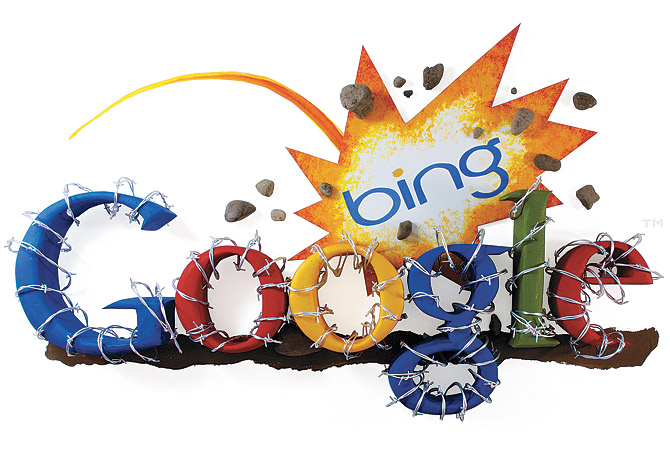In the ongoing battle for search supremacy Microsoft’s Bing search engine has been running attack ads in an attempt to get users to give Bing a try. In a slight change of tactics, the Senior Program Manager at Bing, Meenaz Merchant, published a blog post listing what he feels are the 7 most significant reasons Bing’s image search is better than Google’s. The detailed post compares the top search results for specific terms from Bing & Google and discusses why Bing’s are better.
This is quite different from the more light hearted attack ads they’ve been running in that the information is provided in a much more straight forward way. Merchant lists the seven benefits of Bing Image Search, and describes them in detail, showing why Bing is preferable for the average users.
The seven areas which were listed are:
- Entity Understanding – Is it a Person, Place or Thing? Using images of Prince Albert of Monaco, the explanation shows that Bing returns more direct images of the individual alone, where as Google shows images which feature him along with other people, making it less useful.
- Big Data – Bing uses data from actual users to help improve their search results in the future. If a particular image is clicked on regularly by users, it will move up in the search results for others. This is just one of many benefits of gathering data from user experiences.
- Computer Vision Technologies – Duplicating Human Vision Abilities – Bing claims they are able to more accurately process images the way the human brain sees them. A pretty bold claim, though using the search term “tallest peaks” they did show that their results seemed much better than those from Google.
- Thematic Intent Focus – This one used the search phase “Photos of Italy” where Bing displayed, as you might expect, photos of different places in Italy. Google’s results had maps, flags and some pictures of Italy.
- Exact and Near Duplicates – Bing’s image search, according to this post, uses advanced technologies to determine when pictures are exact or near copies of other images in the results. This allows Bing to filter those images out, leaving a more diverse set of results. The example used the search phrase, “Harry and Hermione” and the results from Bing showed 10 unique pictures of the iconic Harry Potter duo. Google’s results had ten images, three of them being the exact same picture.
- Aesthetics As a Feature – Using the aesthetics of an image as a feature to help or hurt the ranking, Bing is able to provide a more diverse set of images. This helps people to choose the ones they want, because they can see multiple pictures at once. The example phrase used was, “Stanford University” and Bing’s results showed a variety of beautiful pictures of the campus. Google’s had several pictures of the campus, but also two logos and an image of what appears to be a group or club which may or may not be on the campus.
- Quality as a Feature – This one seems very important in this world where HD is king. Bing uses the quality of the image as a factor in ranking the pictures, where Google doesn’t. The example used was the term, “Khloe Kardashian” and they included the image resolution with each result. Bing’s results were consistently twice as high resolution as Google’s.
While Google could undoubtedly make claims that their own image search is superior in other ways, Bing did a good job at laying out some interesting facts. Whether or not this will win over any users, remains to be seen. In addition, Bing seems to have left out a couple of significant advantages. First, Bing has the ‘infinite’ results where new images are loaded at the bottom of the page as you scroll, eliminating the need for changing pages. Also, Bing allows you to search by image license type, which is very useful for marketers looking for free images to include on their pages.
Personally, I’ve long been a fan of Bing’s image search over Google’s, and this post from Bing really illustrates why (pardon the pun). What do you think? Will this help to draw in users, or is it just a waste of Bing’s time because most people won’t ever find this post from Microsoft?




